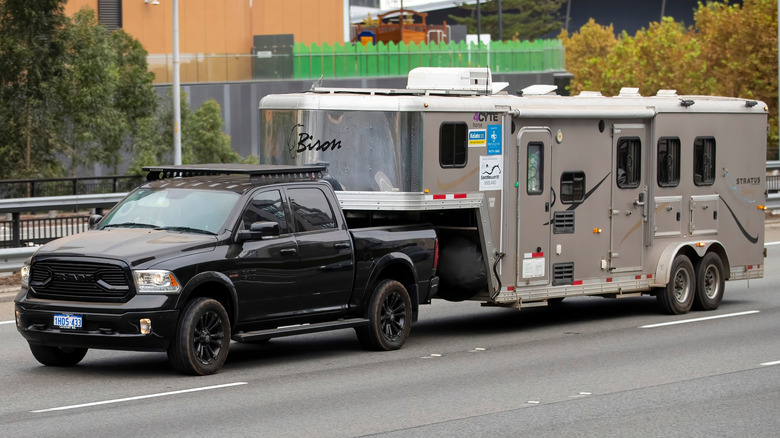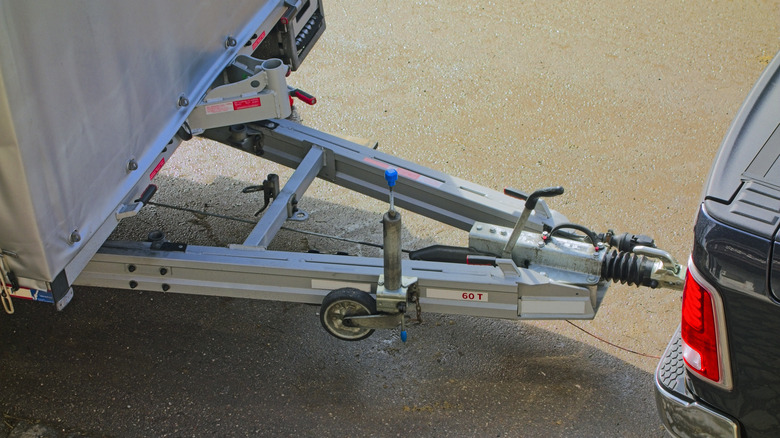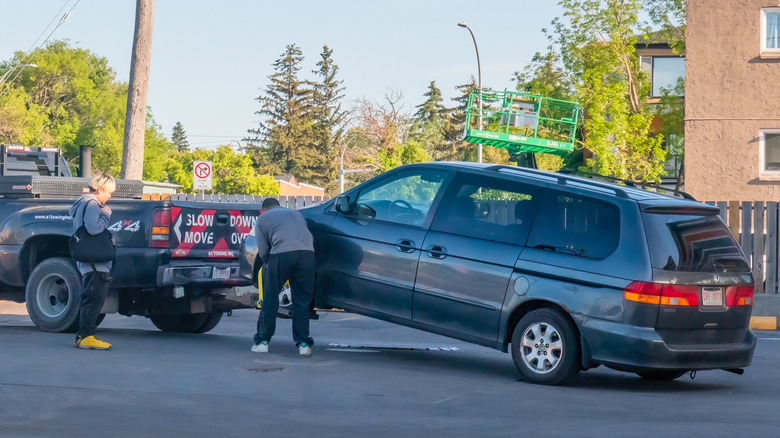What Happens If You Tow Over Capacity?
Towing capacity isn't just some arbitrary number tossed into your vehicle's owner manual to fill up space — it's a precise, calculated figure that tells you exactly what your car, SUV, or truck is able to handle. It's not just a suggestion, either: Towing capacity is the maximum weight your vehicle can safely pull. What's more, it's calculated under the most idealistic of conditions: one driver in the cabin, no cargo, no passengers, and a perfectly distributed load. The moment you add passengers, gear, or an awkward load, your vehicle's true towing capacity is going to change (and not for the better).
Each vehicle has a "maximum towing capacity" rating, but that figure applies only to a specific "ideal" configuration of the vehicle (for example, a heavy-duty truck with a diesel engine, upgraded axles, and a gooseneck hitch). Calculating safe towing capacity in the real world means understanding your Gross Combined Weight Rating (GCWR), curb weight, and payload. Subtract the actual loaded weight of your vehicle from the GCWR, you'll get you a far more realistic towing capacity — and one that's probably going to be even lower than what the manual says. Going over that number doesn't just put unnecessary strain on your vehicle; it puts lives at risk.
The dangers of exceeding towing limits
When you tow more than your vehicle is rated to handle, important systems like brakes, suspension, and axles are dangerously pushed beyond their limits. Overloaded brakes prolong your stopping distance, not to mention the possibility of brake failure (especially when braking on steep grades). Likewise, axles under too much strain can warp, snap, or cause suspension failure, potentially causing you to lose control of the vehicle at higher speeds.
Also consider the impact of increased tongue weight (the downward force the trailer puts on the hitch). An off-balance or overloaded trailer can cause the rear of your tow vehicle to sag and bounce, making steering a real challenge. Tires take a hit, too: Overloaded trailers can cause premature wear, uneven tread, overheating, and even blowouts. Each one could be potentially catastrophic on the highway.
Legally, the problems are just as serious. Towing over capacity can lead to you getting slapped with fines and, in the event of an accident, may even get your insurance coverage taken away. There are also laws against exceeding GVWR or GCWR in certain jurisdictions, with police officers trained to spot sagging suspensions or struggling vehicles.
How to respect tow capacity
To stay in line with your vehicle's towing capacity, you need to understand more than just "how much." Understand how much your vehicle can carry, including passengers, fuel, and cargo. That's your Gross Vehicle Weight Rating (GVWR). Know the fully loaded weight of your trailer. That's Gross Trailer Weight (GTW). Don't forget about the pressure the trailer puts on your hitch. Tongue Weight (TW), and it's typically 10% to 15% of the GTW. Know the differences between them, like towing capacity versus maximum tongue weight. All of these values interact with one another, and when they're not balanced, your entire setup could become unstable.
Another thing to keep in mind: Not all hitches are created equal. Hitch classes range from Class I (up to 2,000 pounds) for small cars and bike racks to Class V (up to 20,000 pounds) for heavy-duty trailers. Pay attention to your hitch's class rating to avoid any discrepancies.
Another good way to make sure you respect towing capacity every time: Inspect your setup before every trip. Check tire pressure, hitch connections, brake lights, load balance, and try to stay around 10% below your maximum towing capacity to leave some room for error. It's not just about protecting your vehicle — it's about protecting everyone else on the road, too.


